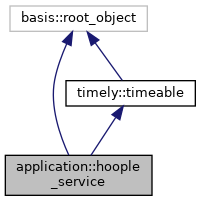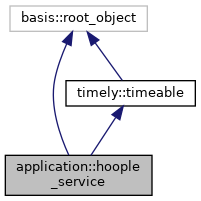A platform-independent way to alert a program that it should shut down immediately. More...
#include <hoople_service.h>


Public Member Functions | |
| hoople_service () | |
| constructor does very little; setup() is what begins operation. More... | |
| virtual | ~hoople_service () |
| DEFINE_CLASS_NAME ("hoople_service") | |
| bool | setup (const basis::astring &app_name, int timer_period=0) |
| constructs a hoople_service for the "app_name" specified. More... | |
| bool | saw_interrupt () |
| reports whether the process saw an interrupt from the user. More... | |
| virtual void | handle_startup () |
| this function is called once the program has begun operation. More... | |
| virtual void | handle_shutdown () |
| called during the program's shutdown process. More... | |
| virtual void | handle_timer () |
| called periodically if a timer period was specified. More... | |
Static Public Member Functions | |
| static bool | is_defunct () |
| returns true if the object has been marked as defunct. More... | |
| static void | make_defunct () |
| used by the derived class to mark that this object is about to exit. More... | |
| static bool | launch_console (hoople_service &alert, const basis::astring &app_name, int timer_period=0) |
| this is used to begin execution of a console mode application. More... | |
| static void | close_this_program () |
| causes this particular application to begin shutting down. More... | |
| static bool | close_application (const basis::astring &app_name) |
| attempts to close the application named "app_name". More... | |
| static void | handle_OS_signal (int sig_id) |
| processes the signal from the OS when its time to shut down. More... | |
Detailed Description
A platform-independent way to alert a program that it should shut down immediately.
This can provide a service management feature for graceful shutdown of an application, allowing it a chance to close its objects cleanly, rather than just being whacked in the middle of whatever it's doing. Only one of these objects should be instantiated per program, but the static methods can be used from anywhere in the program.
Definition at line 34 of file hoople_service.h.
Constructor & Destructor Documentation
◆ hoople_service()
| application::hoople_service::hoople_service | ( | ) |
constructor does very little; setup() is what begins operation.
Definition at line 65 of file hoople_service.cpp.
◆ ~hoople_service()
|
virtual |
Definition at line 69 of file hoople_service.cpp.
Member Function Documentation
◆ close_application()
|
static |
attempts to close the application named "app_name".
this can only be done if this program possesses sufficient rights to zap that program.
Definition at line 94 of file hoople_service.cpp.
References processes::process_control::find_process_in_list(), FUNCDEF, basis::array< contents >::length(), LOG, and processes::process_control::query_processes().
◆ close_this_program()
|
static |
causes this particular application to begin shutting down.
this is a static method available for programs that support the hoople_service's graceful shutdown process. it causes the application to begin the shutdown.
Definition at line 89 of file hoople_service.cpp.
◆ DEFINE_CLASS_NAME()
| application::hoople_service::DEFINE_CLASS_NAME | ( | "hoople_service" | ) |
◆ handle_OS_signal()
|
static |
processes the signal from the OS when its time to shut down.
Definition at line 128 of file hoople_service.cpp.
◆ handle_shutdown()
|
virtual |
called during the program's shutdown process.
this is invoked just prior to the destruction of this class which is also just before the shutdown of the program overall. in this method, the derived object must ensure that any threads the program started get stopped, that any opened files get closed, and that any other resources are released. this is the application's last chance to clean up.
Definition at line 79 of file hoople_service.cpp.
Referenced by launch_console().
◆ handle_startup()
|
virtual |
this function is called once the program has begun operation.
Definition at line 77 of file hoople_service.cpp.
Referenced by launch_console().
◆ handle_timer()
|
virtual |
called periodically if a timer period was specified.
Definition at line 81 of file hoople_service.cpp.
◆ is_defunct()
|
inlinestatic |
returns true if the object has been marked as defunct.
this means that it is either shutting down or soon will be.
Definition at line 53 of file hoople_service.h.
Referenced by launch_console().
◆ launch_console()
|
static |
this is used to begin execution of a console mode application.
this method does not do anything except sit while the extant threads are in play. it will not return until the program must exit, as caused by close_this_program() or close_application().
Definition at line 166 of file hoople_service.cpp.
References application::_global_argv, FUNCDEF, handle_shutdown(), handle_startup(), is_defunct(), program_wide_timer, timely::time_stamp::reset(), basis::SECOND_ms, and setup().
◆ make_defunct()
|
static |
used by the derived class to mark that this object is about to exit.
note that this can be used anywhere in the program to initiate an exit of the program.
Definition at line 136 of file hoople_service.cpp.
◆ saw_interrupt()
|
inline |
reports whether the process saw an interrupt from the user.
Definition at line 61 of file hoople_service.h.
◆ setup()
| bool application::hoople_service::setup | ( | const basis::astring & | app_name, |
| int | timer_period = 0 |
||
| ) |
constructs a hoople_service for the "app_name" specified.
this can be any string, although it might be processed for certain operating systems. also, for close_this_program() to work properly, it must be the application's basename. the "timer_period" specifies how frequently to invoke the handle_timer() method during runtime. if it's zero, then no timer will be used.
Definition at line 141 of file hoople_service.cpp.
Referenced by launch_console().
The documentation for this class was generated from the following files:
- /opt/feistymeow.org/feisty_meow/nucleus/library/application/hoople_service.h
- /opt/feistymeow.org/feisty_meow/nucleus/library/application/hoople_service.cpp